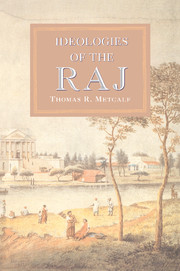5 - Coping with contradiction
Published online by Cambridge University Press: 28 March 2008
Summary
Throughout, as the British put together an ideology for the Raj, they had to contend with the internal contradictions that bedevilled it, above all those between an insistence on India’s difference, and a similarity they could never entirely repudiate. As time went on, these tensions grew ever more unmanageable. By the later decades of the nineteenth century an educated elite, organized in the Indian National Congress, asserted their equivalence to their rulers, and so claimed the rights they felt entitled to as British subjects. Medical researchers in the field of parasitology made discoveries at the same time which revealed that all bodies were inherently the same in their susceptibility to disease. The British did not readily embrace either the political or the medical parallels between themselves and the Indians. On the contrary, in the later years of the century, especially with the outbreak in the 1890s of famine and plague, India was ever more visibly imagined as a land set apart, a land of disease (or of ‘dis-ease’) and disorder. The legacy of the Mutiny in particular contributed to a growing fearfulness that could never wholly be quelled. There remained always a remembrance of a time, evoked in fiction and memoirs for half a century afterward, when all Englishmen, and especially English women, were at risk of dishonour and death.
This sense of vulnerability, of anxiety existing side-by-side with a self-proclaimed ‘mastery’ over an ordered India, found an imaginative centre in Calcutta. Once a ‘city of palaces’ in which the British had taken pride, Calcutta had by the end of the century become the ‘city of dreadful night’. Seen as overrun with sewage, home to endemic disease, and given over to the despised babu, who controlled the Calcutta Corporation, the city nonetheless assumed for the British the shape of a glittering capital, illuminated by the commanding presence of such figures as the viceroy, Lord Curzon. Within it all the contradictions of the Raj converged.
- Type
- Chapter
- Information
- Ideologies of the Raj , pp. 160 - 214Publisher: Cambridge University PressPrint publication year: 1995

